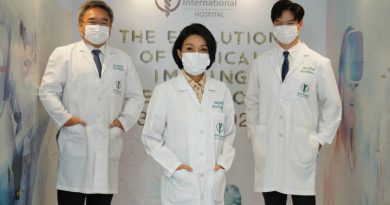Chulalongkorn University Partners with Arabic For All and The Foundation of Sasanupatham School for an International Seminar on Arab Culture and Its Role in the Modern World
Chulalongkorn University Partners with Arabic For All and The Foundation of Sasanupatham School for an International Seminar on Arab Culture and Its Role in the Modern World

Bangkok, December 17-18, 2024 – The Muslim Studies Center, Institute of Asian Studies, Chulalongkorn University, in collaboration with Arabic For All and The Foundation of Sasanupatham School, hosted an international seminar under the theme: “Exploring the Diversity and Richness of Arab Culture: Historical Perspectives, Contemporary Issues, and Future Directions.”
The event, which took place on December 17 at the Chumbhot-Pantip Conference Room, 4th Floor, Prajadhipok-Ramphaipannee Building, Chulalongkorn University, and on December 18 at Raihan Room, 4th Floor, Al Meroz Hotel, Bangkok, brought together academics, policymakers, students, and members of the public to discuss the multi-faceted role of Arab culture in a global context.


Dr. Mohammad Abdulrahman Al-Eshaikh, CEO of Arabic For All, officiated the first day, while Mr. Shareef Sricharoen, Senior Advisor to the Sheikhul Islam of Thailand, presided over the second day.

Dr. Dollaya Tiantong, Deputy Director of the Institute of Asian Studies at Chulalongkorn University, opened the seminar by emphasizing the importance of fostering cross-cultural understanding. “This seminar offers a unique opportunity for participants to learn about and exchange perspectives on Arab culture and its future directions. It is our hope that this event will inspire stronger connections across cultures and enhance international cooperation,” she said.

On the second day, Dr. Srawut Aree, Director of the Muslim Studies Center, highlighted the seminar’s overarching goal “Building bridges of understanding between cultures and nations is essential for creating a sustainable and inclusive future.”
The seminar featured a lineup of distinguished speakers from around the world, offering a broad range of perspectives on culture, history, economics, and contemporary challenges.
1. Dr. Salameh Mohammad Al-Babluwi (Jordan)
Topic The Value of Humanity in Arab Civilization, A historian specializing in Arab humanistic heritage, Dr. Al-Babluwi discussed how Arab civilization has enriched humanity through advancements in art, science, and ethical principles.
2. Dr. Ahmad Muhammad Saleh Al-Shaikh (Saudi Arabia)
Topic The Three Pillars of Islam, A legal scholar and leader in Waqf development, Dr. Al-Shaikh explored the core principles of faith (Iman), worship (Ibadah), and ethics (Akhlaq) as a guide to balance in human life.
3. Dr. Zeid Ali Aldakkan (Saudi Arabia)
Topic Human Rights in Islam, A researcher focused on fostering cross-cultural understanding, Dr. Aldakkan highlighted Islam’s role in promoting equality and justice, while addressing misconceptions about the religion’s approach to human rights.
4. Dr. Abderrahmane Senouci (Algeria)
Topic Governance in Islamic Economics, An expert in Islamic financial governance, Dr. Senouci emphasized the role of governance in ensuring stability and sustainability in Islamic economic systems, with examples from leading financial institutions.
5. Dr. Yusuf Saroj Mafuda (China)
Topic Integrating Islamic Culture in a Global Context, Dean at Xi’an International Studies University, Dr. Mafuda discussed opportunities and challenges in promoting Islamic culture within diverse global societies, focusing on education and cultural integration.
6. Prof. Dr. Kanok Wongtrangan (Thailand)
Topic Applying Islamic Principles in Practice, A scholar-politician, Prof. Kanok shared practical experiences of using Islamic principles to address social issues, emphasizing justice and equity.
7. Assoc. Prof. Dr. Pakorn Priyakorn (Thailand)
Topic Integrating Academic Concepts into Community Policy, Dr. Pakorn outlined the importance of translating academic insights into actionable policies to benefit local communities and address real-world challenges.
The two-day seminar served as a vibrant platform for intellectual exchange, fostering discussions on Arab culture’s historical depth and its modern-day relevance. The sessions were conducted in Arabic and Thai, with live interpretation to ensure accessibility for all attendees.


In his closing remarks, Dr. Mohammad Abdulrahman Al-Eshaikh underscored the importance of Arab culture in building bridges of understanding in the global community. He proposed key initiatives, including developing Arab culture curricula in Thai universities, translating Islamic economic and human rights texts into Thai, and advancing Islamic financial systems in Thailand.
“This seminar has laid the foundation for meaningful international collaboration,” said Dr. Al-Eshaikh, expressing hope for tangible outcomes from the discussions.


Dr. Fairoz Yupensuk, President of the Foundation of Sasanupatham School, extended gratitude to the speakers and participants, urging collective efforts to carry forward the seminar’s vision. “This event marks the beginning of collaboration that can lead to impactful and sustainable outcomes,” he stated.
About the Organizers
1. Muslim Studies Center, Chulalongkorn University
A leading research hub promoting understanding of Muslim societies in Thailand and globally, focusing on knowledge creation and dissemination across diverse cultural dimensions.
2. Arabic For All
A global organization dedicated to promoting the Arabic language and Arab culture among non-native speakers. Over 23 years, it has expanded its outreach to over 100 countries, including partnerships in Thailand.
3. The Foundation of Sasanupatham School
A foundation committed to enhancing educational opportunities for underprivileged youth, especially in Thailand’s southern border provinces. It played a pivotal role in coordinating the seminar by bridging the efforts of Arabic For All and Chulalongkorn University.
Accessibility
The seminar was livestreamed on the following Facebook pages, enabling a broader audience to engage
• Muslim Studies Center
• Sornsasanasasanupatham School
This seminar is a significant step in fostering cross-cultural understanding, inspiring international cooperation, and driving meaningful change for a more connected and inclusive future.




